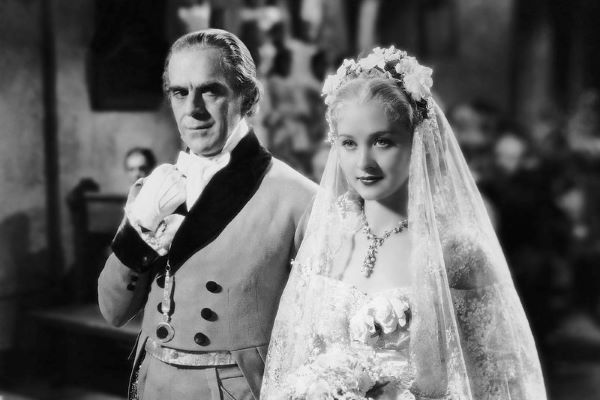It is a bit of a shame that Boris Karloff is best remembered for his role as the Monster in Frankenstein; as indelible as that performance remains. It casts a shroud over a versatile career that can really be appreciated after seeking out some of his lesser-known work. Following Frankenstein, Karloff remained in imposing, overtly monstrous roles in The Old Dark House, The Mummy, and The Ghoul. There was however a lot more to this most avuncular of horror icons, and perhaps it was his role as debonair Satanist Hjalmar Poelzig in The Black Cat that convinced Columbia to pinch the star from Universal. From 1935-42, he appeared in six films, most putting him firmly in a variation of the Dr Frankenstein role instead of the monster. Although, as with the lumbering creature from the film that made his name, he retained the knack of depicting truly sympathetic villains.
Next to the five films that followed, 1935’s The Black Room is something of an outlier. This gothic morality tale has an atmosphere so similar to tales like ‘The Masque of the Red Death‘ or ‘The Tell-Tale Heart‘ that it’s surprising it never dripped from the pen of Edgar Allan Poe himself. Roy William Neil directs Karloff in a dual role of twins, both heirs of a Tyrolean dukedom in the early 19th century, and who have grown up under the prophesy that the younger will kill the elder in ‘the black room’. One twin is evil, and one is good, and Karloff is great in both roles. Some neat trickery for the time has both convincingly onscreen together, and the middle-aged actor’s resemblance to Jeremy Irons is so uncanny that one begins to wonder if David Cronenberg ever saw The Black Room before coming up with Dead Ringers.
Next up are a group of four films that cast Karloff in ostensible mad scientist roles, although good intentions always pave his inevitable descent. The Man They Could Not Hang, The Man With Nine Lives, Before I Hang, and The Devil Commands all share a thematic thread and something of a utilitarian philosophy. In each, Karloff is a genius scientist whose ideas will benefit society. As said society and its various legislatures get in his way, he turns to murder. Of these The Man They Could Not Hang is the best (tying with The Black Room in terms of quality) and sees Karloff as Henryk Savaard, a pioneer of the open heart surgery we now take for granted. After a young volunteer dies during an experiment, he’s sentenced to death and hanged for murder. However, he’s revived by an assistant using the same method and goes on a Jigsaw-like killing spree against the judge and jury who convicted him.
There are diminishing returns as the cycle continues, although each of the films have considerable entertainment value. Karloff is variably a trailblazer in the field of cryogenics, the inventor of an anti-aging serum, and a researcher into human brain waves who becomes obsessed with communicating with his dead wife. In each, he’s essentially playing the same character; a good-hearted and brilliant man who is driven to madness not by inherent evil, but through a clash of progress against the society he hopes to improve. Many decades of hindsight give us extra sympathy for these characters, given that medical advances add a definite plausibility to what would have been contemporaneously outlandish sci-fi elements. Also, our knowledge of other experiments that were being carried out in various concentration camps at the time make the scientists’ endeavours somewhat more sinister than the filmmakers (Nick Grinde behind the camera for the first three, and Edward Dmytryck helming The Devil Commands) may have intended.
The final film in the set is the completely throwaway parody of the ‘Mad Doctor Cycle’, The Boogie Man Will Get You. Lew Lander‘s rickety farce sees our perennially charming antihero hiding the bodies in the basement after selling his tumbledown house to a young divorcee (Jeff Donnell), who for some reason lets him stay and carry on his experiments. Even the great Peter Lorre randomly pulling a Siamese kitten from his pocket isn’t enough to raise a smile. Karloff himself looks vaguely baffled to be a part of it, and the film fails to recreate the atmosphere of those it tries to pastiche. Horror comedy is a difficult thing to crack (only the Abbott & Costello Meet… series have held any longevity from this period), and The Boogie Man Will Get You lacks laughs as well as scares. It seems very obviously a quick and dirty contract filler for the great man.
Despite a dismal final entry, Karloff at Columbia is an excellent collection; particularly The Black Room and The Man They Could Not Hang, which demonstrate what a superb, versatile and charming performer the man born William Henry Pratt really was. He remains an icon for very good reasons.
Available on Blu-ray from Mon 19 Apr 2021
